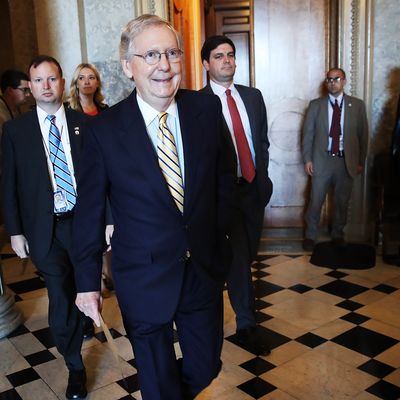
In recent days, John McCain was diagnosed with brain cancer; Rand Paul savaged his party’s health-care plan as “crony capitalism”; and Nevada’s Dean Heller — the GOP’s most vulnerable Senator in 2018 — denounced the bill’s Medicaid cuts, while arguing that it wouldn’t do anything to lower premiums.
But on Tuesday, John McCain got back to town — and Paul and Heller got onboard. A little over a week after Mitch McConnell declared the death of the Senate’s health-care bill, Senate Republicans voted to advance that piece of legislation to debate.
“Obamacare isn’t the answer, but doing nothing to try to solve the problems it has created isn’t the answer,” Heller said in a statement Tuesday afternoon (why he used but instead of and in that sentence is mystery). “That is why I will vote to move forward and give us a chance to address the unworkable aspects of the law that have left many Nevadans — particularly those living in rural areas — with dwindling or no choices.”
Heller went on to promise that if the final bill that emerges out of the coming process doesn’t improve the status quo for Nevadans, he will vote it down.
Meanwhile, Rand Paul — who had previously expressed contempt for any approach to Obamacare save “clean repeal” — found his own way to get to yes. The (ostensibly) fatal problem for McConnell has been that conservative and moderate opponents of Trumpcare have diametrically opposed complaints. But the Senate Majority Leader has resolved this issue by promising that both sides will be able to propose their own amendments — and vote on the bills of their choice — once they supply him with 50 votes to advance all the health-care legislation to debate.
Here, Rand Paul appears to be describing “skinny repeal” — a proposal widely seen as the Senate GOP’s last, best hope to pass health-care legislation out of the chamber. Such a bill would repeal Obamacare’s least popular provisions — the medical device tax, individual and employer mandate — and nothing else. Then, House and Senate leaders would try to hash out a new consensus bill in conference. Why that process would yield a comprehensive Obamacare replacement capable of garnering 50 Senate votes — when the current one didn’t — is not clear. The ostensible wager is that the closer we get to the finish line, the harder it will be for the bill’s skeptics to stand their ground.
Alaska’s Lisa Murkowski and Maine’s Susan Collins both voted against the measure. But with McCain back off the sidelines, McConnell could afford to lose two votes. And other moderate holdouts, including Ohio’s Rob Portman and West Virginia’s Shelley Moore Capito, agreed to play ball.






























